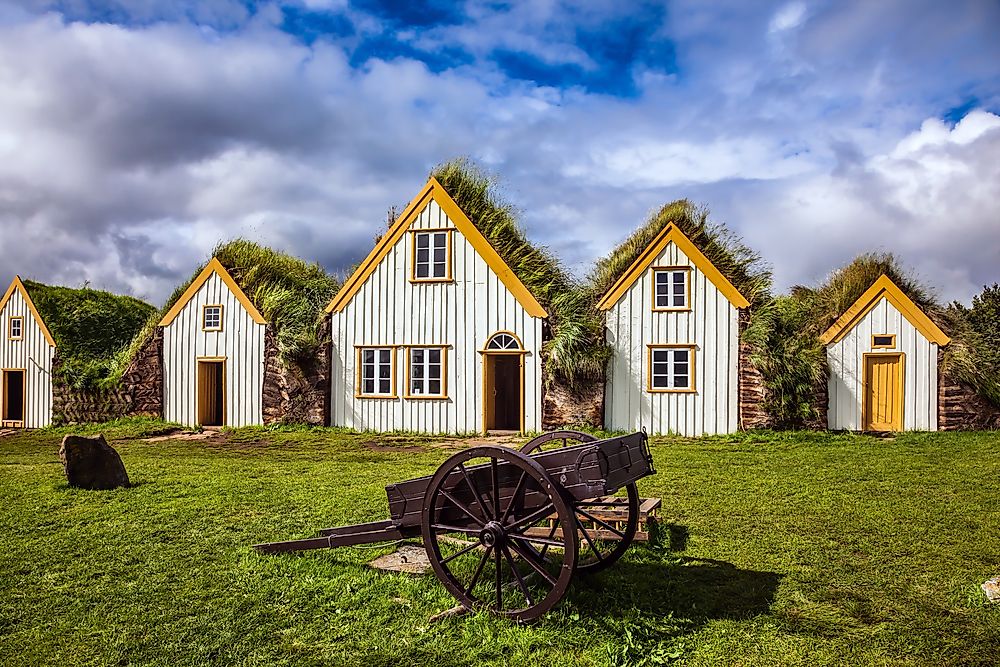The Culture Of Iceland

Iceland is a Nordic island country located in the North Atlantic Ocean with a population of only 343,518 inhabitants. The country is part of Europe and its population is largely homogenous, primarily of Nordic and Gaelic descent, with a foreign population of only 6%. Christianity is the predominant religion in Iceland, and in particular, the Evangelical Lutheran Church of Iceland is the most widely practiced Christian denomination.
Cuisine of Iceland
Iceland's cuisine has a long history. Fish and other seafood, dairy, and lamb are important parts of the country’s cuisine. Since the harsh climate of Iceland makes the cultivation of crops difficult, the diet of the Icelandic people is primarily based on animal products. However, the consumption of vegetables has increased in recent times, but most plant products have to be imported. Some popular Icelandic dishes include Hangikjöt (smoked lamb), kleinur (fried pastry), skyr (an Icelandic cultured dairy product), and laufabrauð (a traditional Icelandic bread). In festivals like Þorrablót, Icelanders enjoy a traditional buffet dinner that includes cured fish and meat dishes served with rúgbrauð (a type of rye bread) and brennivín (an Icelandic distilled spirit).
Icelandic Literature and Graphic Art
Icelandic literature traces its beginnings back to the 13th century, when sagas were written in the Old Norse language. Icelandic works represent a large section of the Old Norse literature Sagas or stories often focus on Nordic and Germanic history, Viking invasions and voyages, and ancient battles.
Prior to the 20th century, Icelandic art was influenced by northern European traditions. However, with the emergence of an independent national identity, Icelandic artists began to focus on the country's unique landscape, mythology, and culture. Abstract art became popular in Iceland during the mid-20th century.
Performing Arts in Iceland
Iceland has a rich and thriving music scene that includes multiple genres including pop, folk, classical, and contemporary. The country is home to many such famous music bands and groups, such as the Sugarcubes, a popular alternative rock band, and the Voces Thules, a celebrated group specializing in medieval music. Several music festivals are hosted in Iceland year round, like the Iceland Airwaves and the LungA Art Festival. Iceland also has a rich tradition of dance, especially folk dance. Annual events like the Reykjavik Dance Festival promote dance in Iceland and provide a platform for Icelandic dancers to showcase their talents to the world.
Sports and Games in Iceland
Icelanders are very active in numerous sports and games, such as soccer, basketball, handball, athletics, swimming, horseback riding, chess, and golf. Chess has a long history in Iceland, as the game was played by the Viking ancestors of many Icelanders. In fact, Iceland has historically produced many chess grandmasters. Another sport associated with the Vikings is Glíma, which is a form of wrestling that remains popular even today. Approximately 1 in 8 Icelanders play golf. Iceland also as one of the world’s best handball teams. Mountain climbing, horse riding, and swimming are all popular leisure activities.
Life in an Icelandic Society
Both men and women enjoy equal rights and freedoms in Iceland. In fact, the country ranks as one of the best in the world in terms of gender equality. The rate of marriage is lower than the rate of cohabitation, and same-sex marriages and other forms of union are also legally permitted in Iceland.
Household units are nuclear in nature, and both single-parent and two-parent families are common. Icelanders tend to get together with their families during religious festivities or social ceremonies like weddings.
Children are important in Icelandic society. Public health nurses regularly visit homes to ensure children are healthy and not subject to any form of abuse. Since both parents often work, the use of daycare services is common. Basic education is compulsory and free.
The Icelandic people are egalitarian in their attitude towards life, and individuals are allowed to live on their own terms as long as it does not harm others. Icelanders tend to be private and reserved with strangers, but are warm and friendly among friends and family. Personal space is highly valued in Icelandic society, and Icelanders are known to be polite, punctual, helpful, and self-sufficient. Despite their modern attitude towards life, Icelanders are also proud of their heritage and take great care to preserve their traditions. Thus, it is not surprising that Iceland is considered to be one of the happiest nations in the world.











